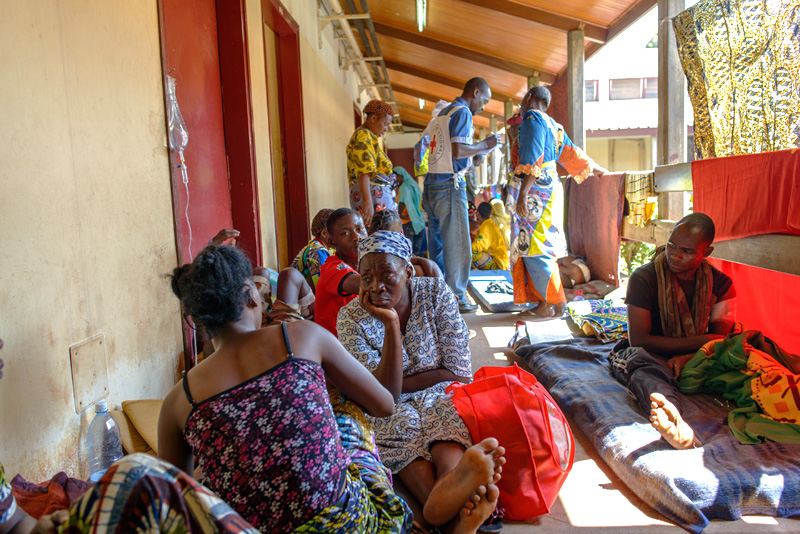Central African Republic: Medical staff must be allowed to do their work
11-12-2013 Operational Update No 08/2013
Since clashes erupted in Bangui on 5 December, the population has been seized with fear. The ICRC is calling for the work of medical and humanitarian personnel to be facilitated to enable them to meet the most urgent needs.

People injured in the recent clashes are treated at the community hospital in Bangui.
"One of our main concerns is to ensure that the injured and the sick are able to obtain care. Most health-care facilities in Bangui are closed," said Bonaventure Bazirutwabo, the ICRC's health coordinator in the city. "In addition, because some medical staff do not feel secure enough to go to work, there is a real risk that the sick could be left to fend for themselves at the very time the crisis is unfolding."
For the capital's inhabitants, especially those who have taken refuge at designated sites, it has become very difficult to obtain health care. The only two health-care facilities still functioning are the community hospital and Castor maternity hospital. "We are calling on the authorities and on all armed men to spare the wounded and medical staff and facilities," said Arnaud de Baecque, deputy head of the ICRC delegation in the Central African Republic. Since the start of the crisis, the ICRC and the Central African Red Cross have taken six pregnant women and 51 injured people to Bangui's community hospital.

An ICRC medical team evacuates a patient from the Boy-Rabe monastery to bring him to the Bangui community hospital.
© ICRC / Rabih Mazboudi
"There is still considerable tension and fear in the capital," said Mr de Baecque. "Thousands of people taking refuge in places of worship or with host families are living in harsh conditions. They have no idea what tomorrow will bring."
Since 7 December, the ICRC has provided maize, beans, cooking oil, salt, rice and kitchen utensils for 35,000 displaced people in the city, including 12,000 at the Don Bosco centre and 9,000 at the Boy-Rabe monastery. In addition, it has installed tap stands to distribute water and built latrines at the monastery and for 40,000 people at the airport displacement site.
The ICRC, which has 40 expatriate and 200 local staff in the country, is continuing its dialogue with the authorities and with all forces on the ground in Bangui. It is insisting that civilians be spared and that Red Cross personnel and medical staff be allowed to carry out their work unimpeded.

Bangui community hospital morgue. Families arrive at the morgue to identify and collect the remains of their loved ones.
© ICRC / Rabih Mazboudi
Most of the ICRC's humanitarian activities in the country have been taking place in close cooperation with the Central African Red Cross, which had more than 200 volunteers in the field at the peak of the crisis.
Since 5 December, the ICRC has also:
- delivered food to detainees and guards – 50 people in all – in a detention centre in Bangui;
- provided logistical and financial support enabling the Central African Red Cross to bury 263 bodies;
- assessed the needs of 78,000 people at five sites in Bangui.
For further information, please contact:
Nadia Dibsy, ICRC Bangui, tel: +236 75 64 30 07
Jean-Yves Clémenzo, ICRC Geneva, tel: +41 22 730 22 71 or +41 79 217 32 17
 Situation on the ground in Bangui
Situation on the ground in Bangui